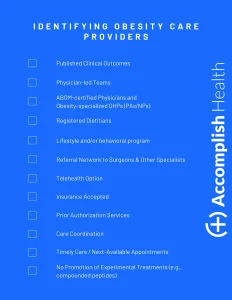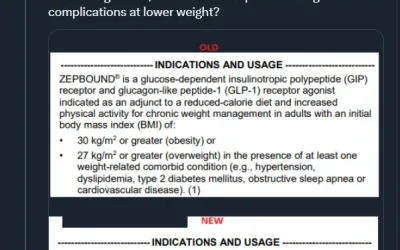Obesity Care vs Weight Loss Commerce: Understanding the Real Difference
Confused about the difference between medical obesity care and commercial weight loss programs? You’re not alone. While both aim to help people lose weight, they represent fundamentally different approaches to treating obesity as a chronic condition.
Understanding True Obesity Care
“Obesity is more than just a number on a scale,” explains Dr. Mike Albert, Chief Medical Officer at Accomplish Health. “It’s a complex chronic disease that requires comprehensive medical care, not just quick-fix solutions.”
Medical obesity care begins with a comprehensive understanding of each patient’s unique situation. Obesity medicine specialists develop personalized treatment plans that may include FDA-approved medications, medical supervision, nutrition therapy, and lifestyle modifications. In some cases, surgical interventions might be recommended as part of a comprehensive approach.
For example, while GLP-1 medications like Tirzepatide can help patients lose up to 20% of their body weight, about 40% of patients may need different or additional treatment options. This highlights why having access to multiple treatment approaches is crucial for long-term success.
Expert Medical Oversight Makes the Difference
Board-certified obesity medicine specialists bring deep expertise to patient care. They understand how to manage complex medical histories, monitor blood sugar levels, and make appropriate medication adjustments. These experts can effectively address common side effects and coordinate with other healthcare providers to ensure comprehensive care.
Real obesity care includes regular check-ins with your medical team, dietary guidance from registered dietitians, and help navigating insurance coverage. This ongoing support ensures patients have the resources they need for long-term success, with care coordination available whenever needed.
The Problem with Commercial Weight Loss Programs
Many commercial weight loss companies now offer medications through telehealth, but their approach often falls short of true medical care. These programs typically provide minimal provider interaction and lack comprehensive health assessments. The limited medical supervision and absence of care coordination with other healthcare providers can leave patients vulnerable to gaps in their treatment.
Commercial programs tend to focus on quick fixes, pushing specific medications without considering alternatives or addressing underlying health conditions. Most concerning is their tendency to operate without proper medical oversight, potentially missing crucial health considerations that could impact treatment success.
The Insurance and Access Challenge
A significant drawback of commercial weight loss programs is their approach to insurance and payment. Many don’t accept health insurance; instead, they charge high monthly fees while providing limited medication options. Patients often find themselves without a backup plan if their coverage changes or if their initial treatment approach needs modification.
Why Comprehensive Care Matters
“True obesity care looks at the whole person,” notes Dr. Albert. “We consider medical history, lifestyle factors, insurance coverage, and long-term health goals to create sustainable treatment plans.” This comprehensive approach ensures that treatment addresses not just weight loss but overall health and well-being.
When evaluating obesity treatment options, it’s important to assess whether the program is led by obesity medicine specialists, accepts insurance, and offers ongoing support. Equally crucial is understanding how the program manages medication adjustments and treatment plan modifications to ensure long-term success.

Diagram of obesity care professional network
The Future of Obesity Care
Effective obesity treatment requires a combination of medical expertise, evidence-based treatments, and ongoing support. Insurance coverage and care coordination are vital in making treatment accessible and sustainable. The most successful approaches recognize obesity as a chronic condition requiring long-term management, not just a quick fix.
Medical obesity care represents a fundamental shift away from commercial weight loss programs toward comprehensive, physician-led treatment. This approach not only helps patients achieve their weight loss goals but also supports their overall health and well-being through evidence-based, personalized care.

Ready to learn more about medical obesity care? Schedule a consultation with an Accomplish Health physician today.
Disclosures:
- Cofounder and CMO of Accomplish Health: a comprehensive virtual obesity medicine platform for patients, providers, and payors
- Consultancy: Elo Health, Gelesis, and Novo Nordisk



